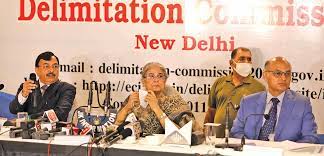
Jammu and Kashmir Delimitation Commission
On May 5 2022, Jammu and Kashmir delimitation commission submitted its final report. After 2 years it was appointed to redraw the electoral boundaries in J&K. After the final draft by the commission 6 additional assembly seats are earmarked for Jammu and 1 for Kashmir. The centre will now fix a date from which the order will be effective. Chief Election Commissioner Sushil Chandra will then rationalise the polling stations and revise the electoral rolls.
J&K Delimitation Commission issues a final notification, reserves 43 Assembly seats for Jammu, 47 for Kashmir
On Thursday, the Delimitation Commission recommended seven additional constituencies to finalise its order for the Union Territory of J&K. Six for Jammu and one for Kashmir taking total number of seats in the UT to 90 from 83 earlier.
This will increase the number of seats in the Jammu Division to 43 from 37 seats earlier. And that in the Kashmir Valley to 47 from 46 earlier. Three other essential takeaways from the order of the delimitation panel, chaired by retired Supreme Court judge Ranjana Prakash Desai, are:
i) reorganisation of the Parliamentary constituencies such that the five Lok Sabha seats now are made up of exactly 18 Assembly constituencies each, taking the total number to 90.
ii) reservation of nine Assembly seats for Scheduled Tribes – six in Jammu and three in Kashmir.
iii) removal of the regional distinction between Jammu and Kashmir and treating it as one; as is reflected in the combining of the Anantnag region in Kashmir with Rajouri and Poonch in Jammu to carve out Anantnag-Rajouri as a Parliamentary constituency.
Besides Justice Desai, it was signed by the two other ex-officio members. Chief Election Commissioner Sushil Chandra and Chief Electoral Officer of Jammu and Kashmir KK Sharma. The Commission also worked with five Lok Sabha MPs from J&K nominated by the Lok Sabha Speaker as Associate Members.
Why was the Commission set up?
Delimitation became necessary when the Jammu and Kashmir Reorganisation Act, 2019 increased the number of seats in the Assembly. The erstwhile J&K state had 111 seats — 46 in Kashmir, 37 in Jammu, and 4 in Ladakh — plus 24 seats reserved for POK. When Ladakh was carved out as a Union Territory. J&K was left with 107 seats, including the 24 for PoK. The Reorganisation Act increased the seats to 114 — 90 for Jammu & Kashmir, besides the 24 reserved for Pok.
In the erstwhile state, the delimitation of parliamentary constituencies was governed by the Constitution of India. And that of Assembly seats was carried out by the then state government under the Jammu and Kashmir Representation of the People Act, 1957. After the abrogation of J&K’s special status in 2019, the delimitation of both Assembly and parliamentary seats is governed by the Constitution.
The Delimitation Commission was set up on March 6, 2020. Headed by retired Supreme Court Justice Ranjana Prakash Desai. It has the Chief Election Commissioner and J&K’s Chief Electoral Officer as members and J&K’s five MPs as associate members.
The time given to the panel, initially one year, was extended several times as the National Conference’s three MPs initially boycotted its proceedings. The first draft recommendations on January 20 suggested an increase of six Assembly seats for Jammu and one for Kashmir. On February 6, it submitted its second draft report.
What is Delimitation?
The Delimitation commission or Boundary commission of India is a commission established by the Government of India under the provisions of the Delimitation Commission Act. The main task of the commission is redrawing the boundaries of the various assembly and Lok Sabha constituencies based on a recent census.
Written By: Ashi Dubey
Mail us at edumoundofficial@gmail.com






